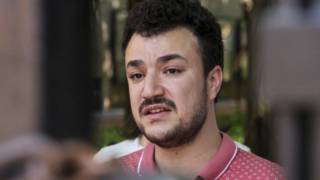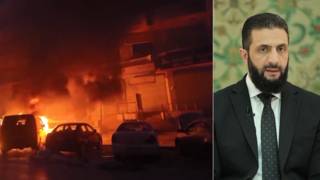HeadlinesFebruary 14, 2019
Congress to Vote on Spending Bill with $1.4 Billion for Border Wall
Congress is poised to vote today on a massive spending bill that would avert another government shutdown on Friday, while granting nearly $1.4 billion for 55 miles of new wall on the U.S.-Mexico border—a fraction of the $5.7 billion that President Trump has demanded. At the White House, Trump said he would look for “landmines” in the deal before deciding whether to sign it.
President Donald Trump: “We’re going to take a look at it when it comes. I don’t want to see a shutdown. Shutdown would be a terrible thing.”
Mexico: Migrant Asylum Seekers Imprisoned in Abandoned Factory
The showdown over Trump’s border wall came as riot police in northern Mexico blocked hundreds of desperate Central American migrants Wednesday as they tried to escape an abandoned factory complex where they’ve been imprisoned while waiting for the U.S. to process their asylum claims. More than 1,700 migrants have been held in the maquiladora in the Mexican border town of Piedras Negras since February 5, after they arrived in a caravan of people seeking asylum in the U.S. The vast majority have remained prisoners at the site, after the Trump administration adopted a “Remain in Mexico” policy for asylum seekers—processing just 15 asylum applications per day at the nearby Eagle Pass border crossing. This is one of the migrants speaking with the Texas-based immigrant rights group RAICES.
Central American migrant: “We are not allowed to go outside. They have locked us up as prisoners. We need organizations to support us with hats and gloves, or with bedding and scarves. That’s what we need, because the cold is tremendous. And the real truth is that there are children here. There are sick people. There are seniors. And the truth is, we’re in an abandoned factory, and now we’re using it as a shelter.”
House Votes to End U.S. Support for Saudi-Led War in Yemen
On Capitol Hill, the House approved a bill Wednesday to end U.S. support for the Saudi-led war in Yemen, which has sparked the world’s worst humanitarian crisis in a half-century. Eighteen Republicans joined the Democratic majority in Wednesday’s 248-177 vote. House Democrats are calling on the Senate to take up the bill, after a majority of senators approved a similar measure last December. President Trump has signaled he would veto the legislation—it would be the first veto of his administration. The British charity Save the Children estimates more than 85,000 Yemeni children under the age of 5 have died from acute malnutrition since the Obama administration first backed a Saudi-led coalition bombing campaign in 2015. The U.N. warns half of Yemen’s population—more than 14 million people—remain on the brink of starvation.
EU Adds Saudi Arabia, U.S. Territories to “Dirty Money” Blacklist
In Brussels, the European Union has added Saudi Arabia to a blacklist of countries that pose a threat due to money laundering and financing terrorism. The EU’s move won’t trigger sanctions against Saudi Arabia but will force Europe’s banks to tighten controls on Saudi transactions. The EU also added four U.S. territories to its blacklist: Puerto Rico, Guam, American Samoa and the U.S. Virgin Islands.
Afghan Taliban to Meet U.S. Envoys in Pakistan for Peace Talks
In Afghanistan, the Taliban said Wednesday it will meet U.S. envoys in Islamabad, Pakistan, next Monday for talks aimed at bringing a ceasefire to the longest war in U.S. history. The announcement came after President Trump signaled he wants to withdraw about half of the 14,000 U.S. troops currently stationed in Afghanistan, although acting Defense Secretary Patrick Shanahan said this week he’s received no orders for a withdrawal. The Taliban has said it wants all U.S. troops out of Afghanistan before it will commit to a peace agreement.
U.S. Bombings in Afghanistan Approached Record Levels in 2018
This comes as new data from the Pentagon show 2018 saw the U.S. drop more bombs on Afghanistan than in any other year in at least a decade. U.S. Central Command says its fighters, bombers and drones released nearly 7,400 weapons last year, as President Trump gave U.S. generals wide latitude to carry out airstrikes without White House review.
Iran: Suicide Bomber Kills 27 Revolutionary Guard Members
In Iran, at least 27 members of the elite Revolutionary Guard were killed Wednesday after a suicide car bomber targeted their military convoy near the Pakistan border. The attack in the Sistan-Baluchestan province in Iran’s southeast was claimed by a Sunni militant group fighting for Baloch independence.
Trump Administration Convenes Anti-Iran Summit in Warsaw
The attack came as the Trump administration convened a conference in Warsaw, Poland, billed as a Middle East peace summit, which was largely aimed at drumming up support for U.S.-imposed sanctions on Iran. Foreign ministers from over 60 countries joined the talks, which are being led by Vice President Mike Pence and Secretary of State Mike Pompeo, along with President Trump’s senior adviser and son-in-law Jared Kushner. France and Germany—who fought the Trump administration’s withdrawal from the 2015 Iran nuclear deal—declined to send foreign ministers to the conference. Ahead of the talks, Israeli Prime Minister Benjamin Netanyahu boasted that the conference was aimed at promoting war with Iran. This is Netanyahu speaking in a video posted on his official Twitter feed.
Prime Minister Benjamin Netanyahu: “What is important about this meeting—and this meeting is not in secret, because there are many of those—is that this is an open meeting with representatives of leading Arab countries, that are sitting down together with Israel in order to advance the common interest of war with Iran.”
Giuliani Calls for Regime Change in Iran at Rally Hosted by Terrorist-Linked Group
President Trump’s personal attorney Rudy Giuliani spoke on the sidelines of the Warsaw summit, calling for the overthrow of Iran’s government during a speech at a rally of Iranian exiles known as the MEK, which was formerly on the U.S. terrorist watch list. Giuliani later admitted he was paid by the group to speak at their rally. This week marks the 40th anniversary of Iran’s revolution, which toppled the U.S.-backed dictatorship.
NYT: Trump Admin Expanded Program to Sabotage Iran’s Rockets
Meanwhile, The New York Times reports the Trump administration has ramped up a secret program aimed at sabotaging Iran’s rockets and missiles—a program that may be behind recent failures by Iran’s space agency to launch satellites into orbit. The Times cited unnamed Trump administration officials who said the U.S. has worked secretly for years to slip faulty parts and materials into Iran’s aerospace supply chain.
Rep. Ilhan Omar Grills U.S. Venezuela Envoy over Role in U.S.-Backed Massacres
In Washington, D.C., the new U.S. special envoy to Venezuela, Elliott Abrams, testified on Capitol Hill Wednesday on U.S. efforts to oust Venezuelan President Nicolás Maduro, three weeks after the U.S. recognized opposition leader Juan Guaidó as Venezuela’s new president. Elliott Abrams is a right-wing hawk who was also linked to the 2002 coup attempt in Venezuela that tried to topple Hugo Chávez. Abrams was convicted in 1991 for lying to Congress during the Iran-Contra scandal, but he was later pardoned by President George H.W. Bush. In the 1980s, Abrams defended Guatemalan dictator General Efraín Ríos Montt as he oversaw a campaign of mass murder and torture of indigenous people. Ríos Montt was later convicted of genocide. This is Democratic Congressmember Ilhan Omar of Minnesota confronting Abrams over his record Wednesday.
Rep. Ilhan Omar: “In 1991, you pleaded guilty to two counts of withholding information from Congress regarding your involvement in the Iran-Contra affair, for which you were later pardoned by President George H.W. Bush. I fail to understand why members of this committee or the American people should find any testimony that you give today to be truthful.”
Elliott Abrams: “If I can respond to that”—
Rep. Ilhan Omar: “It wasn’t a question.”
We’ll have more on Venezuela after headlines.
House Committee Advances First Gun Control Legislation Since 2007
The House Judiciary Committee advanced a pair of bills Wednesday that would expand federal background checks for firearm purchases, in what would be the first new gun control legislation in years. Democrats voted 23 to 15 along party lines in favor of the bills—among them, Georgia freshman Congressmember Lucy McBath, whose 17-year-old son Jordan Davis was shot dead in 2012 at a Florida gas station.
Rep. Lucy McBath: “The two bills that sit before us today will ensure mothers and fathers have one less reason to worry about when they send their children off to school. They’ll give students one less thing to fear when they walk into their schools. And most importantly, it will make our communities and our nation a safer place. I talk to victims. I have been working with victims for the last six years, and I refuse to talk to one more parent that is scared every single day when they send their children off to school.”
The legislation will head to a vote in the full House of Representatives, but Republican leaders have said it will be dead on arrival in the Senate. The bills advanced just ahead of the first anniversary of the Valentine’s Day massacre at Marjory Stoneman Douglas High School, when a former student armed with a semiautomatic rifle gunned down 17 students, staff and teachers in just three minutes. Since then, guns have claimed the lives of nearly 1,200 U.S. students. We’ll have more on today’s anniversary of the Parkland massacre later in the broadcast.
FEMA Administrator Brock Long Resigns
The head of the Federal Emergency Management Agency, Brock Long, said Wednesday he is resigning his post after less than two years on the job. Long’s resignation came after a government auditor found he improperly used government vehicles to travel to and from his home in North Carolina. As FEMA administrator, Brock Long oversaw the Trump administration’s widely criticized response to devastating wildfires in California and other western states, as well as a series of major hurricanes in 2017—Harvey, Irma and Maria. Last year, a George Washington University study commissioned by Puerto Rico’s governor found over 3,000 people died as a direct result of Hurricane Maria. After Donald Trump disputed the findings, Brock Long defended the president.
Brock Long: “These studies are all over the place. The Harvard study was done differently, studies a different period of time, versus the George Washington study. There’s a big discrepancy, whether it’s direct deaths or indirect deaths.”
In response to Brock Long’s resignation Wednesday, San Juan Mayor Carmen Yulín Cruz tweeted, “Brock Long was Trump’s hatchet man in the botched Puerto Rican relief effort after hurricanes Irma and María. He should have been fired and held accountable for the loss of lives.” Deputy FEMA chief Peter Gaynor will serve as acting administrator until the Senate confirms a replacement.
Judge Rules Paul Manafort Intentionally Lied, Breaking Plea Deal
A federal judge ruled Wednesday that President Trump’s former campaign chair Paul Manafort broke the terms of a plea agreement when he “intentionally lied” to the FBI, a grand jury and federal prosecutors. D.C. District Judge Amy Berman Jackson ruled Manafort lied about his dealings with a suspected Russian intelligence operative named Konstantin Kilimnik, as well as other matters related to special counsel Robert Mueller’s investigation. The ruling could add years to Manafort’s prison sentence. Last year, Manafort was convicted on eight felony charges, including tax and bank fraud. He later pleaded guilty to two additional counts of conspiracy.
Top Democrat Suggests Acting AG Matthew Whitaker Lied to Congress
The chair of the House Judiciary Committee is threatening to depose acting Attorney General Matthew Whitaker, suggesting he may have lied under oath last week when he testified to Congress about his communications with Donald Trump regarding the president’s former attorney, Michael Cohen. In a letter sent to Whitaker Wednesday, New York Democratic Congressmember Jerrold Nadler wrote, “[M]embers on both sides of the aisle found many of your answers to be unsatisfactory, incomplete or contradicted by other evidence.” This comes as the Senate is set to vote today on whether to confirm William Barr, President Trump’s nominee to replace Jeff Sessions as attorney general.
A Record 7 Million Americans At Least 90 Days Behind on Car Payments
The Federal Reserve reports a record 7 million Americans are three months or more behind on their car payments, in a worrying sign for the U.S. economy. The rate of auto loan defaults is even higher than it was in 2010, when U.S. unemployment topped 10 percent at the height of the Great Recession.
Argentina: Tens of Thousands March Against IMF-Imposed Austerity
In Argentina, tens of thousands marched through the capital Buenos Aires Wednesday, blocking roads to protest high unemployment and austerity measures imposed by President Mauricio Macri, including cuts to public utility subsidies. The austerity measures have led to higher water and electricity bills. They come as Argentina submitted to a plan by the International Monetary Fund to end much of its fiscal deficit by the end of the year. This is Argentine labor leader Hugo Godoy.
Hugo Godoy: “Our people do not want this agreement with the International Monetary Fund, which we want to repeal. We have bills and proposals for government policies that include the needs of the Argentine people.”
Philippines Journalist Maria Ressa Released on Bail
And in the Philippines, award-winning journalist Maria Ressa was released on bail early Thursday following her arrest in a cyber libel case that’s widely seen as politically motivated. Ressa is the founder of the independent news site Rappler and a vocal critic of the Philippines’ authoritarian president, Rodrigo Duterte. This is Maria Ressa, speaking just after her release from the custody of the National Bureau of Investigation.
Maria Ressa: “My stay last night at the NBI really made me think about what this is all about. Right? And for me, it’s about two things: abuse of power and weaponization of the law. This isn’t just about me, and it’s not just about Rappler. The message that the government is sending is very clear, and someone actually told our reporter this last night: Be silent, or you’re next. So, I’m saying and I’m appealing to you not to be silent, even if, and especially if, you’re next.”
Most popular
- 1
- 2
- 3
- 4
Non-commercial news needs your support
Please do your part today.











Media Options